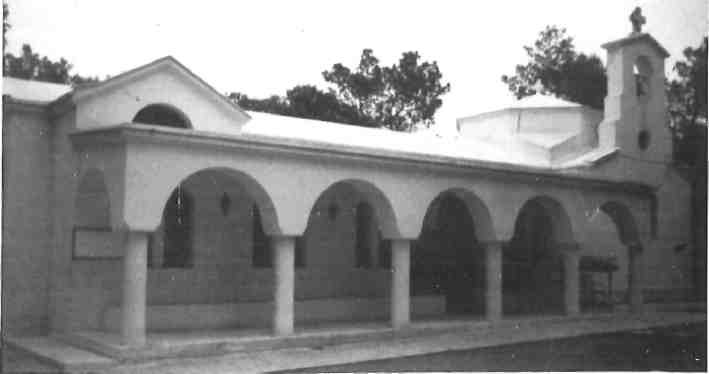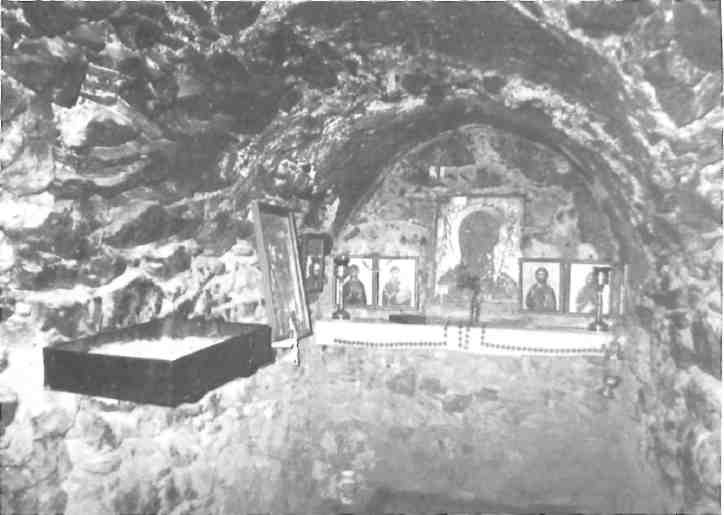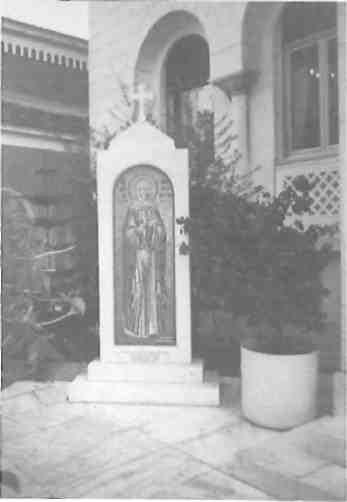With both the Clean Monday celebration and the start of Lent looming up on the social/religious horizon, it is perhaps a fitting time to remember the saintly Athenian, Filothei, whose feast day the Orthodox church celebrates on the 19th of February. Widely revered among her own compatriots who have raised churches and sanctuaries in her name all around the globe, her example of steadfast courage and compassion in the face of repression and prejudice is one which the re-emerging Orthodox congregations of eastern Europe are finding increasingly pertinent. Although the biographical details of her life are often based on conjecture and legend, her gentle but nonetheless powerful influence lives on in the collective memory of the faithful and is historically stamped on her native city where it survives in street and place names.

As in other forms of literature, hagiography has its own format which often begins with the mysterious circumstances of the saint’s birth: Filothei’s is no exception. Her mother, Sirigas, the wife of Anghelos Benizelos, a prominent Athenian, believed herself to be barren – a shameful female defect in 16th century Greece – and prayed long and hard for a child which would bless her marriage. Kneeling in front of an icon in church one day in a state of deep contemplation, she suddenly saw a light shine out from it and heard a voice saying that her prayers had been answered. Naturally alarmed at these supernatural happenings, she jumped up and rushed home, but true to nature, nine months later she gave birth to a daughter who was a good and pious child.
When Regilla (or, perhaps, Regoula), as the child was called, reached her early teens, her aging parents, in keeping with the prevailing custom, married her off to a socially suitable man much older than she. He was a merchant of, it seems, severe and insensitive character who was often away from home, and who remained completely impervious to his wife’s religious influence. His death a few years later released her from the loveless isolation of incompatibility, and she returned to her parent’s home a teenage widow with an unrelenting determination never to remarry. On the death of her parents she turned the house into a small Christian commune where she prayed, fasted and worked together with her servants whom she initiated into a ‘sisterhood’. The servants’ views on this arrangement remain of course unknown, but from all accounts they lived together in godly harmony.
One day while she was praying aloud to Saint Andrew, the family protector, he told her that to fulfill her destiny she must erect a church in his name. Obediently, she built it on her estate where it soon formed the nucleus of a convent with cells and outbuildings. Regilla now changed her name to Filothei, cut her hair and took to wearing simple clothes.

Poor girls and orphans were soon attracted to the convent. To help them, Filothei set up an educational institute called “The Parthenon”, endowing it with land and property. There she taught them the Scriptures, embroidery and weaving. Its renown slowly attracted the daughters of wealthier families who subsequently made large donations to the convent.
Like many late medieval cities at that time, Athens had its share of homeless beggars and cripples who were persecuted and incurably ill. Filothei, deeply concerned for their suffering, opened a combination hospital and hospice near the convent. To the desperate she offered the spiritual solace of kindness and understanding while treating their bodily afflictions with simple herbal remedies. No one seeking shelter or aid was ever turned away.
At a time when women were rarely seen in public and very seldom heard, all this activity on Filothei’s part brought harsh criticism both from the governing Turks and from the Greek leaders. Schools during the centuries of Turkish occupation were generally prohibited or operated clandestinely, and no section of Saint Andrews’ Convent aroused more fury than the Parthenon Institute. Girls were not supposed to be literate, especially poor ones.
Filothei acknowledged the pressure of deep-seated prejudice and threats as inevitable but quietly continued her work undauntedly. Fully occupied with teaching, nursing the sick and providing spiritual comfort she nevertheless founded a second convent of sisters under the auspices of Saint Andrew outside of Athens near the mountain of Tourkovouno at a spot known as Per-sos where she owned land. Today, the area bears her name – Filothei. This was, from all accounts, the sanctuary most beloved by her. Here she built large comfortable cells for her Christian sisters but her own was small and sparse. Fulfilled through her work, she was able to strip her material needs to the bare essentials.
As good roads were then non-existent, she also built a well of stone equidistant between Persos and the city where travellers and villagers walking the dusty route could refresh themselves. To indicate that it was for all to drink from, she had carved on it the word psychiko meaning a gift of charity. It stood next to the present-day Athens Old People’s Home (Yerokomeion Athenon) and survived 400 years. At the beginning of this century it was filled in and covered over by construction work. The memory of it lingers on in the name of the garden suburb which grew up to the north of it – Psychiko.

Filothei created another small convent of Saint Andrew’s out in the country near Patissia and yet another called Daphne Theotokou at the port of Kea in Piraeus. Her success attracted ever-growing fury and envy from men in authority but such was her popularity that no one openly abused her. Antagonism came to a head, however, when she gave shelter to four runaway Greek slave girls (in those days girls were often sold) who had escaped from their Turkish owner. Enraged, the Turkish governor had her arrested. Filothei, calmly acknowledging the accusations, stated that she was prepared to die rather than reveal their whereabouts. Her relatives protested and such was the furor and rage of the Athenians that the city elders interceded on her behalf, and she was released after paying an enormous fine.
Filothei threw herself back into her work despite harrassment and continual threats. “God,” it is recorded, “had now found her worthy to perform miracles.” Even in our materialistic times many a seemingly miraculous cure has been accomplished through a combination of compassion and herbal knowledge. Certainly, the sick came to her from all over Attica, and her name was invoked as a talisman against plague and disease.
Like many other historical martyrs who devoted their lives to non-violence (Gandhi and Martin Luther King spring readily to mind), she incited feelings of violence in those in power and on the night of 2 October 1588, while she was administering at her small convent in Patissia, hired thugs broke in and beat her savagely, assuming that she was dead. Barely alive, she was taken slowly and lovingly to her favorite sanctuary at Persos where she lingered on for four months. On 18 February the following year “she commended her innocent soul to God. ” According to the Holy Synod, her body was exhumed sometime afterwards and found to be whole and sweet-smelling. This factor, along with her martyrdom brought about by her selfless devotion to her less fortunate and suffering compatriots to which end she donated her entire fortune and estate, led to her canonization a little later during the patriarchate of Matthew II at the end of the century.
Her remains, somewhat depleted as bones have been stolen over the years, now lie in a silver casket in the cathedral of Athens. A plaque in Greek, German and Italian briefly listing the events of her life, hangs on the wall above her icon. While the site of Saint Andrew’s convent in Plaka is occupied today by the Archbishop’s Palace and its adjoining church, a more modern St. Andrew’s, both are situated on aptly-named Filothei Street. Her memory is further commemorated by a mosaic in the palace forecourt.
Unlike many other privileged women involved in charity work, there was nothing self-aggrandizing or sanctimonious about Filothei. Supplicants at her convents were not treated to holier-than-thou harangues or given hectoring advice. With deep humility, she served the needy, attracting them to her by her very gentleness and infinite compassion. From all accounts, Filothei was truly a saintly woman.







